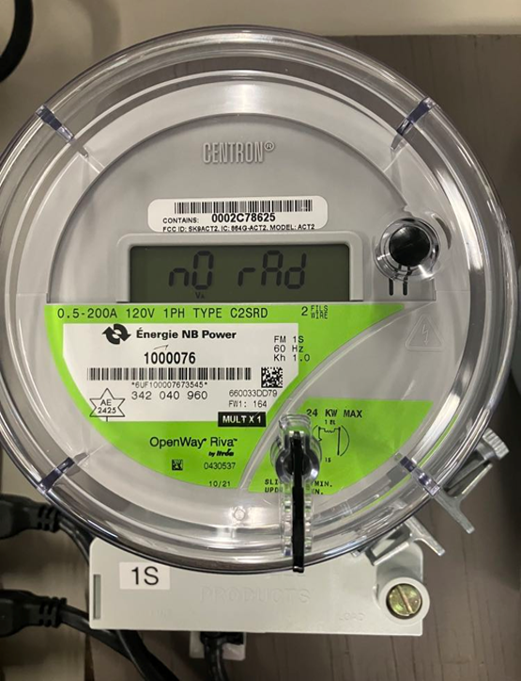Smart Meter Information Sessions
Information sessions give customers an opportunity to voice their questions and concerns about smart meters.
Looking to participate in an information session? View our calendar to find one near you.
Below is the presentation and a summary of Q&A from previous sessions.
Smart meters provide information about energy consumption. Customers with a communicating smart meter and an NB Power online account can go online to see exactly how much energy their household is using in 15-minute, hourly, daily, and monthly intervals. They can view their consumption in both kilowatt hours and the dollar amount.
Customers with smart meters will also receive energy usage alerts. Like a cell phone data plan, you can get usage alerts when your power bill is trending 30% higher than the same month in the previous year, and set up custom alerts when your usage reaches a threshold you choose. Learn more.
NB Power follows federal and provincial laws on privacy, protection and disclosure of your personal information. We only collect information for billing purposes, and based on the law, we can only use it for that purpose. No customer-identifying information—such as names and addresses—is stored in the meters or transmitted across the network.
Some customers, especially commercial customers, may choose to download energy information from their online account and share it with an energy advisor or consultant who can help them reduce their energy consumption.
NB Power is considering adopting time-of-use (TOU) rates as an option for customers in the future, but has not made any decisions on how that rate structure will look. Our commitment to our customers is that we will not explore time-of-use rates until all the meters have been deployed across the province. This means there will be no changes until at least November 2025.
NB Power can't just change rates. We must submit an application to the New Brunswick Energy and Utilities Board (EUB), an independent body that regulates power rates, and they must approve the rates before we can make the change. Through the EUB process, customers can participate and ask questions. A public intervener is appointed to represent customers at the rate hearings. The intervener's role is to challenge NB Power and make sure that the information that NB Power provides is valid and on the record for the board to be able to decide on rate changes.
Smart meters measure energy consumption and are regulated by Measurement Canada. They follow a rigorous testing process to ensure they measure accurately.
In other jurisdictions, smart meters were implemented when time-of-use rates were introduced. Customers got a smart meter and had new rates simultaneously and didn’t have a chance to understand how it would impact what they pay for energy use. They associated the bill increase with the smart meter, but it was not the smart meter, but the new rate plans.
In NB Power’s case, we will not change the rate structure until after all smart meters have been deployed. We want our customers to experience the smart meter and see that their bill is based on energy they use, not the meter. We are giving our customers time to understand how energy consumption impacts their bills. They can change their behaviours, which may result in a lower bill.
If a new rate structure is implemented, participation will be optional, giving customers a choice to decide whether the rate structure meets their needs and fits their lifestyle. Our commitment to customers is to provide the information and tools they need to make an informed decision.
Yes, there have been many studies on radio frequency (RF). RF is governed by Safety Code 6 from Health Canada. Smart meters emit significantly less RF than many common household items. One example is your cell phone. You carry it on you, put it to your ear, carry it with you all the time. It emits more than 12,000 times more RF than a smart meter.
Smart meters are safe. An in-depth review of the scientific literature by the World Health Organization (WHO) revealed that the small amount of RF produced by smart meters is not harmful to human health.
No, smart meters emit far less RF than many household items such as baby monitors, smart home devices, microwaves and televisions. Smart meters meet all of Health Canada's safety requirements.
There will be a fee for customers who do not want a two-way communicating meter, but it has yet to be established. It will be determined after we have completed installations across the province and we know how many customers have opted out. Once we know that number, we can calculate what it will cost to read all non-communicating meters manually. Again, we can't just impose that fee on our customers. We must take it to the energy and utilities board, which will decide what we are and aren't allowed to charge. If you have opted out, you’ll receive information about the fees and be given an opportunity to make your choice.
Yes, customers can request a smart meter at any time.
Smart meters measure energy consumption and are regulated by Measurement Canada. They follow a rigorous testing process to ensure they measure accurately.
In other jurisdictions, smart meters were implemented when time-of-use rates were introduced. Customers got a smart meter and had new rates simultaneously and didn’t have a chance to understand how it would impact what they pay for energy use. They associated the bill increase with the smart meter, but it was not the smart meter, but the new rate plans.
In NB Power’s case, we will not change the rate structure until after all smart meters have been deployed. We want our customers to experience the smart meter and see that their bill is based on energy they use, not the meter. We are giving our customers time to understand how energy consumption impacts their bills. They can change their behaviours, which may result in a lower bill.
Yes, customers will be able to modify their behaviours to take advantage lower rates. With smart meters, the power is in your hands. When the time comes for time of use rates, we’ll equip customers with tips and tricks to maximize cost savings.
Everyone’s situation is different. There are various ways to implement time-of-use rates. NB Power is currently testing rates with customers in the Shediac area as part of our Smart Grid Atlantic Project. We are testing different rates and seeing how customers respond to them. We want to understand how a new rate structure will affect our customers before we implement anything. Also, if a new rate structure is implemented, participation will be optional.
This is a good question to explain why power utilities are moving to time of use rates. When energy consumption peaks and all generating stations are firing - like when everyone gets up in the morning and starts to get ready for the day - that’s the most expensive energy we produce at NB Power. Some of our stations only run to serve peak events. If we can encourage people to use electricity at a different time, then NB Power's costs will decrease. And if our costs go down, our customers will see that in their rates. Time of use rates incentivise customers to use power at different times of the day than peak times.
No, the EUB does not automatically grant NB Power requests. Through the Energy and Utilities Board (EUB) process, customers have the chance to have their say and ask questions. The public intervenor advocates for customers during rate hearings and scrutinizes NB Power's submissions to ensure accuracy and relevance, enabling the board to make informed decisions regarding rate adjustments.
The portal is user-friendly, simply log into your online account on nbpower.com to see the consumption graphs and your bill. Don’t have an online account yet? It’s quick and easy to create one! Need help? You can contact our Customer Care advisors, who can walk you through it and show you how it works. Call 1 800 663-6272.
Smart meters cycle through several screens. When the communication functions have been turned off there will be a no radio frequency “nOrAD” display screen.

We know some customers like to read their meter occasionally. Here’s how to read a smart meter:
- Unlike our digital display meters, smart meters cycle through nine (9) different screen displays. Each have their very own purpose.
- The only screen that impacts residential customers is the one that shows the kWh usage. It will appear with a code “d1” to the left. Residential customers are billed based on kWh.

- You may also see the kW demand usage on the “d4” screen. This reading does not apply to residential customers. Only commercial and industrial customers are billed for demand. Learn more about demand and energy.
Historically we used cellular or modem bidirectional meters for net metering customers. However, since smart meters have bidirectional and communication capabilities, we standardized using smart meters for new net metering customers in November 2022. Eventually all net metering customers will have a smart meter.
Participating in Net Metering enables you to export excess energy produced by your generator when your premise’s energy needs are fully met in exchange for energy credits. Net metering is not intended for the sale of excess electricity back to NB Power. Any excess electricity not used during the current billing period will appear as a credit and is carried forward. All credits can be carried forward and used up month to month until March 31st each year when your balance resets to zero.
Implementing the necessary infrastructure and replacing all meters in the province will cost approximately $97 million. NB Power presented a business case to the EUB that demonstrated that the benefits of smart meters outweigh the cost. Things like remote disconnects and reconnects, the ability to identify and restore power outages more quickly and prevent outages before they happen, having to send fewer trucks to read meters, and reducing staff will save NB Power money. Even though we're investing $97,000,000 in this upgrade, the benefits outweigh the costs.
Although we will eliminate many meter reader positions, we will retrain employees to fill positions throughout the company. NB Power has an aging workforce, so positions will be reduced through retirements and other forms of attrition.
No, we do not disconnect a customer without making many attempts to work with the customer on a payment plan. If a customer isn’t willing to work with us and maintain communication, after numerous attempts have been made, disconnection is a last resort. NB Power has policies and procedures for disconnecting power and there are rules around disconnecting power during the winter months. These policies and procedures will remain the same with smart meters. Learn more.
There are two different things at play in this question.
There are time-of-use rates, which is what everybody's been asking about. But time-of-use rates are completely different from our annual rate increase. On an annual basis, NB Power goes to the Energy and Utilities Board (EUB) to ask for a rate increase; it's the normal course of business for NB Power.
The transition to time-of-use rates is separate from our annual rate increase. Time-of-use rates will only be introduced once all smart meters are deployed. At that point, we will carefully determine the rates and seek approval from the EUB, ensuring a transparent and fair process.
I can assure you that we are doing this diligently. The rates we implement must benefit customers and the utility.
For more information visit www.nbpower.com/smartmeters








